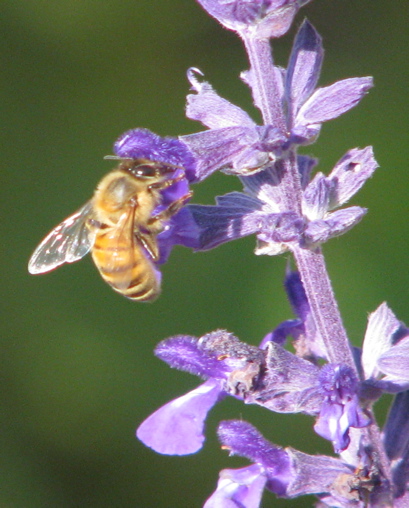“Soybean fields or canola fields or sunflower fields, they all have this systemic insecticide.”

I know I’ve been singing this song for a long time, y’all, but it’s bad, bad, bad and getting worse.
Soaring Bee Deaths in 2012 Sound Alarm on Malady – NYTimes.com
“They looked so healthy last spring,” said Bill Dahle, 50, who owns Big Sky Honey in Fairview, Mont. “We were so proud of them. Then, about the first of September, they started to fall on their face, to die like crazy. We’ve been doing this 30 years, and we’ve never experienced this kind of loss before.”
When beekeepers and scientists first starting investigating colony collapse disorder, causes were uncertain. Rowan Jacobsen’s excellent book, Fruitless Fall, explores possible reasons. (Here’s one of my many posts about the book.)
Five years later, we have a much clearer idea of exactly what is happening, and it’s very bad news.
But many beekeepers suspect the biggest culprit is the growing soup of pesticides, fungicides and herbicides that are used to control pests.
While each substance has been certified, there has been less study of their combined effects. Nor, many critics say, have scientists sufficiently studied the impact of neonicotinoids, the nicotine-derived pesticide that European regulators implicate in bee deaths.
The explosive growth of neonicotinoids since 2005 has roughly tracked rising bee deaths.
Neonics, as farmers call them, are applied in smaller doses than older pesticides. They are systemic pesticides, often embedded in seeds so that the plant itself carries the chemical that kills insects that feed on it.
The pesticide is embedded in the seeds. I posted to another piece on this topic this last week, and these are just a couple of the many anxious reports I’ve picked up on my bee wire (Google Alerts, when they’re working) in the past few months. I know I’m probably preaching to the choir here, but I implore you to read up on this issue, if you haven’t yet, and to spread the word far and wide. If we lose the bees, we lose the world as we know it.

Joann says:
Yeah. Cause hand pollinating a couple hundreds acres of corn ain’t a good plan!
Insecticides, pesticides and fungicides genetically implanted into our food sources are having effects on humans as well. Many of these things are banned in other countries.
On March 30, 2013 at 3:45 am
Ellie says:
**sigh** The bees are something I worry so much over, and feel utterly helpless about. What can we *do*? The agriculture industry is even bigger than Big Pharma.
On March 30, 2013 at 5:34 am
Joann says:
Ellie, buy locally grown food as much as you. Join a CSA that uses natural or organic products. Be aware that the regs for organic compliance in the last few years have changed towards accommodating big Ag rather than sustainable smaller farms.
Grow your own food – there are many resources available to help urban and suburban “farmers” figure out what to raise. Raise bees if possible.
And I say this kind if cautiously avoid buying your organic food from places like Walmart. That can be a double edged sword – how will such places know that consumers demand good quality door is they don’t buy it at super stores?
But for us, we try to avoid mass produced food when possible. We have come to the point that the only processed foods we buy are cereal (just can’t kick the Cheerios habit!) and staples like flour, sugar.
Occasionally I succumb to the temptation of canned cream of whatever soup for certain luscious holiday casseroles. Most often because we have a gluten free kid, we make all this stuff from scratch.
Since you are a Lissa fan you probably already do many of these things.
But be aware of these issues and inform others.
On March 30, 2013 at 8:42 am
Ellie says:
Thanks, Joann. Yeah, it was something of a rhetorical question 🙂 …. In terms of what can we do, I was thinking more along the lines of legislation geared at altering the agricultural industry. That’s what I’d like to see, **in addition** to all of those good things you listed, which are so important for individuals and communities to commit to. And by legislation, I mean state and federal. This train (the agriculture industry) has been rattling for some while now; I doubt we’re going to see significant changes any time soon. And I’m no politician 🙂 so I don’t think it’s something I’m going to be involved in …
On March 30, 2013 at 11:40 am